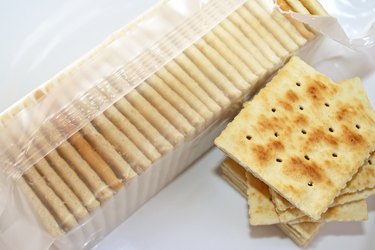
Yes, only eating crackers and drinking water will make you lose weight in the short term — but it also has serious consequences. This sort of starvation diet often leads to gaining the weight back as soon as you go back to your normal habits — and it can even cause health problems.
The Cracker and Water Fast
Video of the Day
There's no single, definitive "cracker diet," but typically the term implies that you're only eating crackers and drinking water, or sometimes eating limited quantities of foods that work well with crackers — for example, small amounts of soup. You might call it a cracker and water fast.
Video of the Day
It's hard to argue with the fact that a diet like this will make you lose weight, due to its extremely restricted calorie count.But that's actually a problem, because eating only crackers and drinking water can put you well below the minimum calorie intake you should have without a doctor's close supervision.
The National Heart, Lung and Blood Institute advises that most women can lose weight safely on a diet of 1,200 to 1,500 calories per day. Most men, and women who exercise regularly or weigh more, can safely lose weight with a diet of 1,500 to 1,800 calories per day. The Institute also warns that very low-calorie diets of fewer than 800 calories a day should only be attempted under a doctor's supervision.
As the National Institute of Diabetes and Digestive and Kidney Diseases points out, "crash" diets can prompt the development of painful gallstones. So can repeatedly losing weight and gaining it back. As elaborated on at Penn State, this sort of crash diet can also reduce your muscle mass, prompt binge eating and cause nutritional deficiencies.
To add insult to injury, the weight is likely to come right back on — with a vengeance — as soon as you go back to your normal habits. To put it bluntly, the cracker diet is a quick, temporary fix that can hurt you.
Read more: Can Crackers Help You Lose Weight?
There Is a Healthier Way
You might achieve similar (and equally unhealthy) results with any diet that focuses on only one food. But the cracker diet is particularly concerning because it only addresses one of the food groups — grains — in such a limited way. If you're eating white crackers made of refined flour it's even worse, because you're missing out on most of the fiber and nutrients you could get from whole grain crackers.
You can lose weight in a healthier way. And although healthy weight loss might not be as quick or as spectacular as a crash diet, the weight is more likely to stay off — so doing it the healthy way actually gives you better results in the long run.
To achieve that healthy weight loss, which the Centers for Disease Control and Prevention defines as 1 to 2 pounds per week, every day you must consume 500 to 1,000 calories fewer than your body uses. Any mobile app with a food diary function — or even a good old-fashioned notebook — can help you track your calorie intake and expenditure.
For a starting-out calorie goal, use the Department of Health and Human Services estimates for daily calorie intake based on your age, gender and activity level. Those estimates are for maintaining your weight. To lose weight, either decrease your calorie intake or increase your physical activity, or both, to achieve the desired calorie deficit.
Finally, here's the biggest departure from the cracker diet: Make sure you eat from all the major food groups. The Department of Health and Human Services offers a collection of key recommendations to help you achieve the sort of balanced, healthy diet that gives your body the fuel it needs while still helping you lose weight.
Read more: Crackers That Are Good for Weight Watchers
- National Institute of Diabetes and Digestive and Kidney Diseases: "Dieting and Gallstones"
- Penn State: "What Are the Consequences of Fad Diets?"
- National Heart, Lung and Blood Institute: "Healthy Eating Plan"
- Centers for Disease Control and Prevention: "Losing Weight"
- Department of Health and Human Services: "Appendix 2. Estimated Calorie Needs Per Day by Age, Sex, and Physical Activity Level"
- Department of Health and Human Services: "Key Elements of Healthy Eating Patterns"